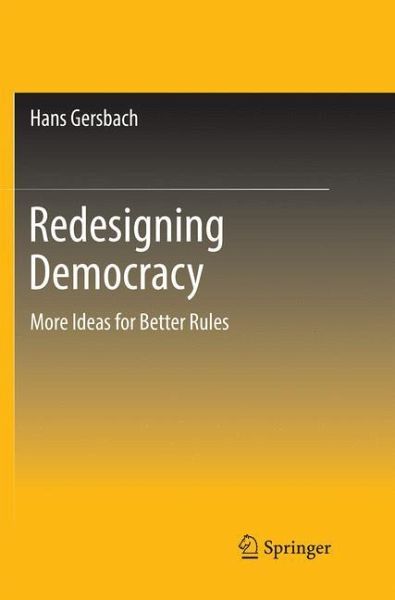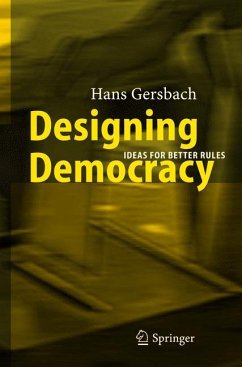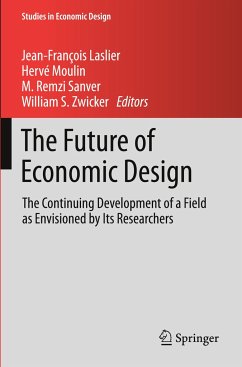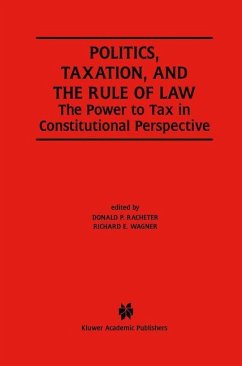
Redesigning Democracy
More Ideas for Better Rules
Versandkostenfrei!
Versandfertig in 6-10 Tagen
98,99 €
inkl. MwSt.
Weitere Ausgaben:

PAYBACK Punkte
49 °P sammeln!
Could democracy do better? This book presents a vision on optimal democracies and a set of new rules to help achieve them. The monograph follows on the author's successful book "Designing Democracy" from 2005 and further develops its ideas.While liberal democracies are the best systems of self-governance for societies, they rarely provoke great enthusiasm. Democracies have been known to fail in achieving efficient outcomes and fair distributions of wealth. Moreover, many citizens take the democratic system for granted, simply because they have yet to experience an alternative. This book argues...
Could democracy do better? This book presents a vision on optimal democracies and a set of new rules to help achieve them. The monograph follows on the author's successful book "Designing Democracy" from 2005 and further develops its ideas.
While liberal democracies are the best systems of self-governance for societies, they rarely provoke great enthusiasm. Democracies have been known to fail in achieving efficient outcomes and fair distributions of wealth. Moreover, many citizens take the democratic system for granted, simply because they have yet to experience an alternative. This book argues that the potential offered by democracies has not yet been exhausted, and that optimal democracies are both the Utopia for societies and the aim that scientists should commit themselves to making a reality. Furthermore, the book suggests a number of insightful rules to improve the functioning of democracies.
"We all know what to do, we just don't know how to get re-elected after we have done it." This famous quip by Jean-Claude Juncker perfectly encapsulates the challenge this book takes on: how to redesign our democratic institutions to overcome political short-termism and make our democracies more efficient. Several radical but highly relevant proposals are explored, ranging from long-term incentive contracts for politicians, prediction markets over the outcomes of the next election that could be useful for incentive purposes, minority voting, initiative group constitutions, and so on. All these highly innovative proposals are rigorously grounded in standard economic analysis. I highly recommend this book to anyone concerned about the state of our democracies and looking for constructive reforms.
Patrick Bolton, Columbia University, USA
In a time of reeling democracies, it is urgent to explore how to improve on the electoral system for the benefit of society. Hans Gersbach has developed a most innovative and thought-provokingresearch agenda at the intersection of political theory, social choice and mechanism design. He uncovers the potentially positive effects of political contracts between candidates and society, of new rules for agenda setting and of mechanisms compensating the minorities.
Marc Fleurbaey, Princeton University, USA
While liberal democracies are the best systems of self-governance for societies, they rarely provoke great enthusiasm. Democracies have been known to fail in achieving efficient outcomes and fair distributions of wealth. Moreover, many citizens take the democratic system for granted, simply because they have yet to experience an alternative. This book argues that the potential offered by democracies has not yet been exhausted, and that optimal democracies are both the Utopia for societies and the aim that scientists should commit themselves to making a reality. Furthermore, the book suggests a number of insightful rules to improve the functioning of democracies.
"We all know what to do, we just don't know how to get re-elected after we have done it." This famous quip by Jean-Claude Juncker perfectly encapsulates the challenge this book takes on: how to redesign our democratic institutions to overcome political short-termism and make our democracies more efficient. Several radical but highly relevant proposals are explored, ranging from long-term incentive contracts for politicians, prediction markets over the outcomes of the next election that could be useful for incentive purposes, minority voting, initiative group constitutions, and so on. All these highly innovative proposals are rigorously grounded in standard economic analysis. I highly recommend this book to anyone concerned about the state of our democracies and looking for constructive reforms.
Patrick Bolton, Columbia University, USA
In a time of reeling democracies, it is urgent to explore how to improve on the electoral system for the benefit of society. Hans Gersbach has developed a most innovative and thought-provokingresearch agenda at the intersection of political theory, social choice and mechanism design. He uncovers the potentially positive effects of political contracts between candidates and society, of new rules for agenda setting and of mechanisms compensating the minorities.
Marc Fleurbaey, Princeton University, USA












